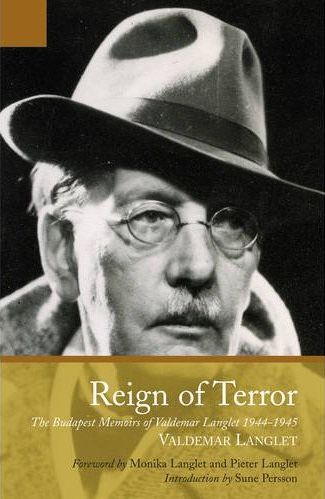| Title: | Reign of Terror |
| Author: | Valdemar Langlet |
| Editor: | Pen & Swords Books |
| Published: | 2012 |
| Pages: | 187 |
| ISBN: | 9781848326590 |
| Review: |
While elsewhere in Nazi-Germany occupied Europe the trains to the destruction camps in Poland had already begun to roll, it lasted until the spring of 1944 before the Hungarian Jews became involved in deportations. German troops had invaded the country in March 1944 after the head of state admiral Miklos Horthy had approached the allies. Horty had, up to that time, been loyal to Hitler. At first Horty held on to his position, but a new government was formed which was forced by the Germans to cooperate with the deportation of the Jewish population. During that spring approximately 43,000 Jews were deported to Auschwitz, but it would have been many more if there had not been people like the Swede Valdemar Langlet. His memoires about his stay in Budapest during this period have recently been published in the English language. The introduction has been edited by his grandchildren and politicologist Sune Persson. Valdemar Langlet, born in 1872 in a village in the vicinity of Stockholm, was, together with his spouse, already before the war had started part of the diplomatic society of Budapest. He lived in Budapest since 1931 where he gave lessons in Swedish at the university. Because of his knowledge of the Hungarian language he was hired by the Swedish embassy as a cultural attaché. He and his wife became introduced to many people within the cultural and societal public of the city, which would be helpful during the war years to come. Sweden was a neutral country during the war and the Langlets were therefore allowed to continue their stay in Budapest. When in May 1944 the deportations of the Jews commenced, they started their rescue work. Without the Swedish Red Cross being informed they issued Schutzbriefe ( protective letters) in which it was mentioned that the owner of the letter was protected by the Swedish Red Cross. Thanks to such document many Jews in the city were saved from deportation. In August 1944 Langlet was appointed as yet as the representative of the Swedish Red Cross at the Swedish embassy in Budapest. He had to perform his task however without financial and material support from Sweden. The management of the Red Cross in his home country did not realize the seriousness of the humanitarian situation in Budapest and was disturbed by the unorthodox ways of the headstrong Langlet. Thanks to his connections in town he succeeded in building a network of locations where persons-in-hiding could be housed under protection of the Red Cross. When in October 1944 the anti-Semitic and fascistic Arrow Cross Party got into power in Hungary the safety that Langlet had arranged for his persons-in-hiding was over. Members of the militia roamed the streets of Budapest looking for hiding places and also invaded Langlets ‘safe houses’. Because the Arrow Crossers discovered that Langlet offered protection to the Jews, on December 11th 1944 he was forbidden to be active any longer as a humanitarian worker. During the last weeks of the war Langlet and his wife themselves had to prevent that they ended up in the hands of the murdering and pillaging street gangs of the Arrow Cross Party. In the meantime the city was beleaguered by the Red Army. Mid-January 1945 the eastern part of the city (Buda), where the Langlet couple resided, was liberated by the Soviet Army. The Langlets received protection of the Soviet-Union and were allowed on 2 February 1945 to restart their activities for the Red Cross. One of the tasks they were charged with, was the distribution of food to the starving citizens. After the Swedish embassy had been forced to leave town on 15 March because the Swedish government had not yet recognized the new Hungarian state, Langlet stayed on. Again without the permission of the Red Cross in Sweden he carried out his activities under a Swedish-Hungarian aid organization which was established by himself. On 26 May 1945 the couple Langlet left the city in order to reach Göteborg on the 2nd of September after a lengthy journey by ship from Istanbul. Immediately after the war Valdemar Langlet wrote his memoires about his activities in Budapest during the period 1944-45, which were published in Stockholm in 1946. The same year he was decorated with the silver medal of the Swedish Red Cross, which in 1949 was followed by his appointment to Knight of the Order of the Polestar. After his death in 1960 he and his spouse, who would live on till 1988, were nominated to the “Righteous among the Nations” by the Israelian Institute for the Holocaust Yad Vashem because of their help to the Jews during the war. Different from his compatriot Raoul Wallenberg, who saved the lives of thousands of Jews as an employee of the embassy in Budapest and who was captured by the Soviets in 1945 after which he was never seen again, Langlet nowadays has hardly been heard of. Except in Budapest where a quay of the Danube since the summer of 2010 carries his and his wife’s name. It was on the bank of the Danube where the Arrow Crossers executed thousands of Jews in the winter of 1944-1945. Valdemar Langlet was not a very inspiring author. His memoires, which have been translated into English, read in general as a business report stripped from emotion. Much more than a personal account of his experiences and feelings, it is a description of the political and diplomatic developments in Budapest. Also mentioned are the activities of the Red Cross as they were deployed by himself and the people that assisted him. Only in the chapter about the period in which the Arrow Crossers became active it becomes thrilling. The reader is carried along when Langlet describes how the drunk and aggressive Arrow Crossers invade one of his ‘safe houses’ whilst the nuns that are present there are doing their utmost to hide their refugees. It is not so that the remainder of the book is dull; because it is interesting to read under which circumstance Langlet, without support from Sweden has involved himself with his fellow-man without any concern for himself and at the peril of his own life. However, the reader who wants to be carried away in a story full of heroism and excitement, ingredients that are actually very much available in this history, will not be satisfied. “Reign of Terror” is foremost an important historical source which provides knowledge about an almost forgotten hero. |
| Beoordeling: | |
Information
- Translated by:
- Fred Bolle
- Article by:
- Kevin Prenger
- Published on:
- 26-12-2012
- Feedback?
- Send it!




